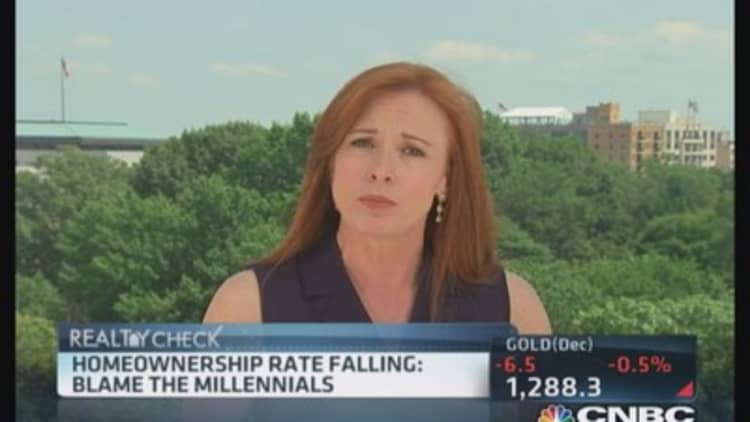
Homeownership continues to fall, and younger Americans will push it even lower.
Rising home prices, skyrocketing student loan debt, rising mortgage rates and changing life choices—any one factor would affect how and when people make the single largest investment of their lives. But add them up and the results are striking.
The nation's homeownership rate fell to 64.7 percent in the second quarter of this year, according to the U.S. Census Bureau. That is the lowest level in 19 years. Add to that just over one million homes with mortgages that are either delinquent or in the foreclosure process (per Black Knight Financial Services) and the rate is even lower than recorded.
As the economy improves, more people will buy homes, but younger Americans will wait longer. The typical age of a first-time homebuyer in 2002 was 31, according to the National Association of Realtors.
A Zillow survey of more than 100 economists and real estate experts found more than half of respondents expect that age to rise marginally, and nearly one quarter expect it to hit 34 or older over the next decade. This as millennials reach their prime home-buying years.
"The millennial generation will have enormous influence in coming years, especially as they hold off on getting married and having children, the two biggest reasons for first-time home purchases," said Zillow chief economist Stan Humphries. "A lower homeownership rate because of these demographic shifts will have a ripple effect, keeping rents high and potentially impacting the broader economy if substantially fewer people pay property taxes and buy fewer home goods."
Millennials in general do intend to buy at some point, but the headwinds they face today are stronger than those faced by their parents and grandparents. First and foremost is employment.
Read More5 hot housing trends this summer
Among 25-to-34-year-olds, which is considered the prime age group for housing demand, employment fell to 75.6 percent in July from 75.8 percent in June and 76 percent at the beginning of the year, according to the Bureau of Labor Statistics.
"Young-adult employment is less than halfway back to normal: Before the bubble, their employment-population ratio hovered in the 78-80 percent range," noted Jed Kolko, chief economist at Trulia, a real estate website. "Having a job matters for housing. Just 12 percent of employed 25-to-34-year-olds live with their parents, versus 20 percent of 25-to-34-year-olds without jobs."
Student loan debt is as large a deterrent, if not larger. loanDepot, an independent mortgage lender, examined applications for 46,000 borrowers looking to purchase a home between 2010 and 2014. It found that the median age of first-time buyers went from 34 to 36 years old.
It also found, when looking at borrowers with student loan debt, that with all other factors (debt, credit score) equal, the difference between those approved for a mortgage and those not approved was a monthly student loan payment of less than $300.
Read MoreHomeowners: A new class of fools
While mortgage rates today are far lower than they were in previous decades, underwriting is far stricter than it was during the latest housing boom, and fees charged by government entities Fannie Mae and Freddie Mac, which back the vast majority of new home loans, are taking a bite out of affordability.
Mortgage closing costs rose 6 percent over the past year and now average $2,539 on a $200,000 loan, according to a new report from Bankrate.com. Origination fees accounted for the bulk of the increase, jumping 9 percent, while third-party fees rose 1 percent.
"New mortgage regulations are the biggest reasons why closing costs went up over the past year," said Holden Lewis, senior mortgage analyst at Bankrate.com.
Read MoreBuying a house remains out of reach for many
Texas' closing costs are the highest at $3,046 and Nevada's are the lowest at $2,265. Mortgage applications to purchase a home are now down 12 percent from a year ago, according to the Mortgage Bankers Association.
Even the low down payment option, with loans backed by the Federal Housing Administration (FHA), is not as cheap as it used to be. In the wake of the housing crash, FHA raised insurance premiums for borrowers, and average credit scores are higher as well.
This is why the majority of adult children currently living with their parents—a higher than normal share today—will likely rent rather than buy when they do finally move out, according to a recent survey by Fannie Mae. Good news for the rental market, but a sign that the homeownership rate is unlikely to reverse any time soon.
—By CNBC's Diana Olick


